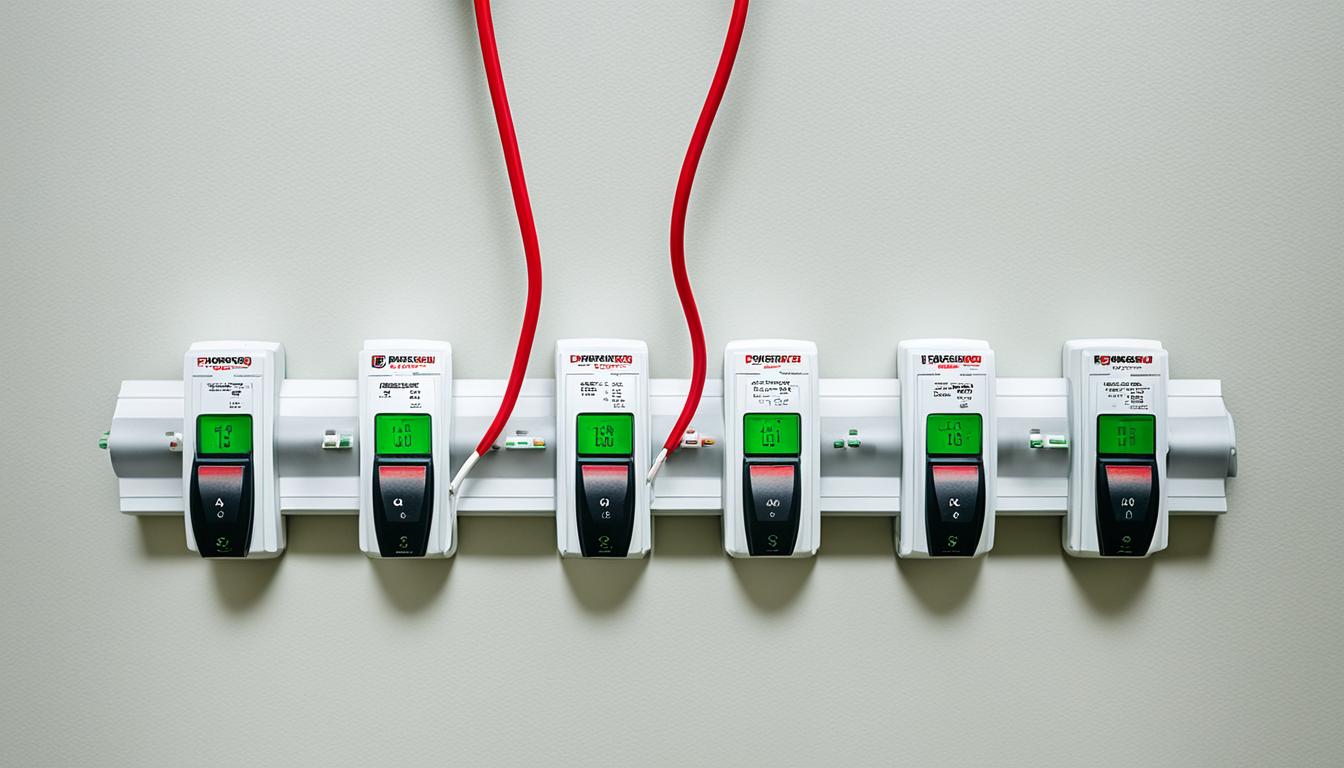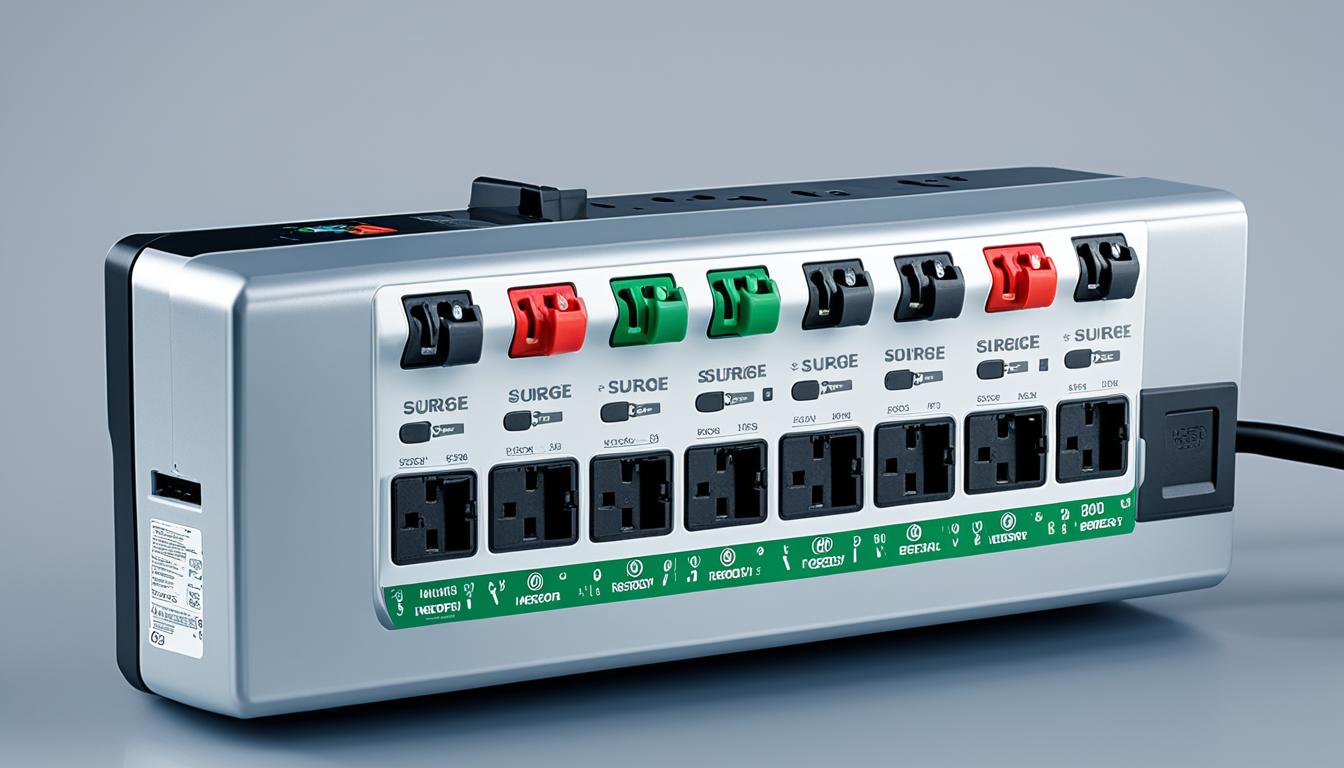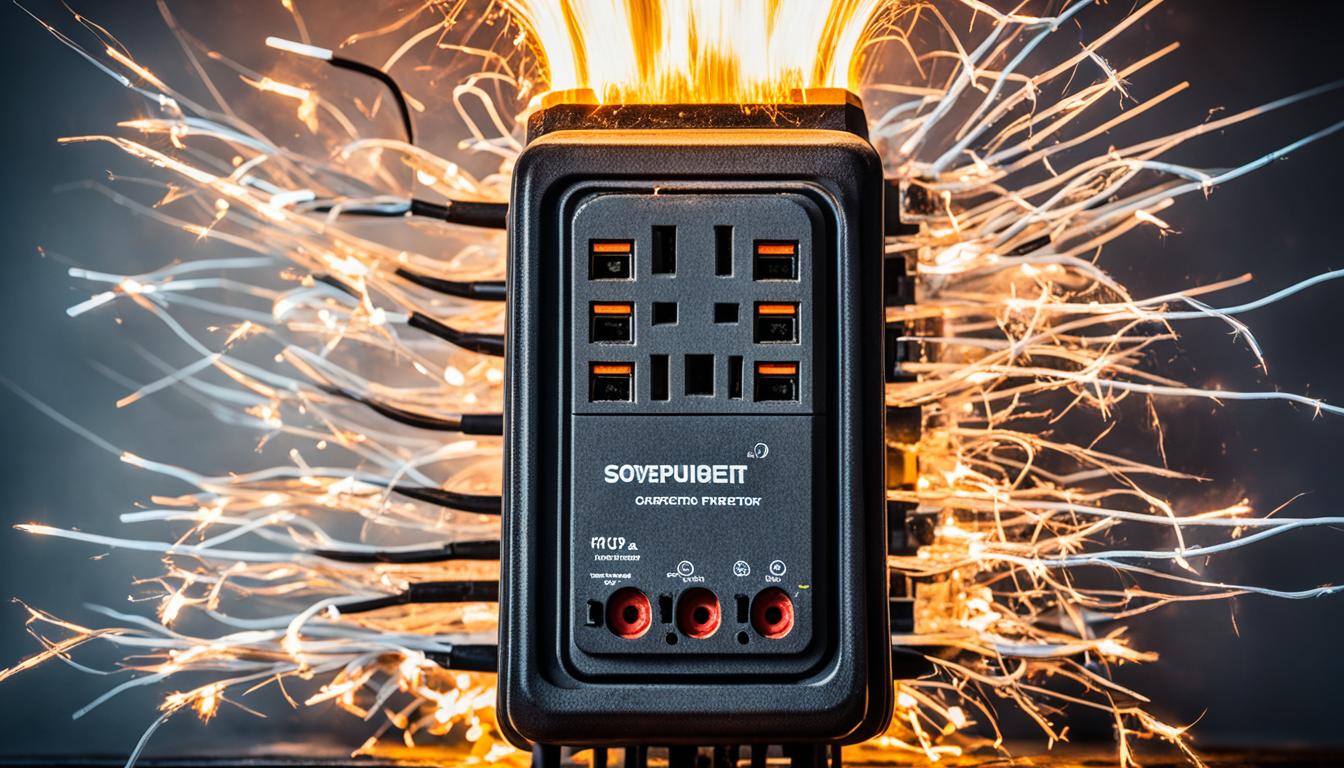extensioncords.site and its partners may earn a commission if you purchase a product through one of our links
Many people wonder if it is safe to plug a washer into an extension cord. It is important to follow safety guidelines when using electrical extension cords to prevent accidents and potential fire hazards. By understanding how extension cords work, the potential dangers of using them incorrectly, and the proper guidelines for usage, you can ensure the safety of your washer and other appliances.
Extension cords are a convenient solution for extending the reach of electrical outlets and connecting multiple appliances to a single power source. However, it is crucial to use them correctly to avoid any potential risks. Let’s explore the basics of extension cords, their ratings, and the guidelines for using them with washers and other appliances.
Key Takeaways:
- Plugging a washer into an extension cord can be dangerous if not done properly.
- Understanding how extension cords work and their load capacities is crucial for safe usage.
- Follow the appliance usage guidelines and avoid overloading the extension cords.
- Ensure proper electrical safety precautions when using extension cords.
- Add additional outlets to your home if needed, to reduce reliance on extension cords.
How Do Extension Cords Work? Understanding Volts, Amps, and Watts
Extension cords are a convenient solution for extending the reach of electrical outlets and connecting multiple appliances to a single power source. But have you ever wondered how extension cords actually work? Let’s dive into the world of volts, amps, and watts to understand how these cords function.
Volts measure the electrical tension or force that pushes the current through the cord and appliances. It is similar to the pressure of water flowing through a pipe. In the United States, most homes have electrical outlets that provide a standard voltage of 120 volts (V).
Amps represent the amount of electrical current flowing through the cord. Think of it as the volume of water flowing through a pipe. Different appliances require different amperage levels to function properly. For example, a small lamp may only require 0.5 amps, while a powerful vacuum cleaner can require 12 amps or more.
Watts measure the amount of electrical energy used by an appliance. It is calculated by multiplying the volts (V) and amps (A) together. Watts determine the power consumption of an appliance, indicating how much electricity it uses per unit of time.
Now, let’s understand how these concepts come together when using extension cords. When you connect two 120V appliances to a 120V outlet via an extension cord, the cord does not split the current evenly between the two appliances. Instead, each appliance draws the current it needs based on its specific amp requirements.
For example, if you have a lamp that requires 0.5 amps and a fan that requires 1 amp, both can be safely connected to a single extension cord without overloading it. The extension cord acts as a bridge, allowing each appliance to draw the necessary amperage from the power source.
By understanding the principles of volts, amps, and watts, you can ensure the safe and efficient use of extension cords. It is important to choose an extension cord that can handle the amperage requirements of your appliances and follow the manufacturer’s guidelines for usage. Remember to always prioritize safety and avoid overloading your extension cords to prevent electrical accidents and potential fire hazards.
Are Electrical Extensions Safe? Statistics on Safety
It is important to understand the potential dangers of using extension cords. Improper usage of extension cords can lead to electrical fires, short circuits, and damage to electrical equipment. According to the US Consumer Product Safety Commission (CPSC), approximately 3,300 electrical fires are caused annually by incorrect extension cord usage. Furthermore, about 50 people die each year due to extension cord accidents, and 270 people require hospital treatment. These statistics highlight the importance of using extension cords safely.
When it comes to electrical extension cord safety, it’s crucial to prioritize precautions and follow proper guidelines. By doing so, you can protect yourself, your home, and your loved ones from potential hazards. Understanding the risks associated with extension cords can help you make informed decisions and take the necessary steps to ensure electrical safety.
To give you a better understanding of the dangers of improper extension cord usage, here are some key statistics:
Approximately 3,300 electrical fires are caused annually by incorrect extension cord usage in the United States.
These fires not only pose a threat to your property but also put lives at risk. By using extension cords responsibly, you can significantly reduce the chances of electrical fires and the devastating consequences they can have.
About 50 people die each year due to extension cord accidents.
These fatalities serve as a sobering reminder of the importance of using extension cords safely. By taking the necessary precautions and following safety guidelines, you can help prevent accidents and protect yourself and those around you.
Approximately 270 people require hospital treatment as a result of extension cord accidents.
These injuries can range from minor burns and electrical shocks to more severe electrical injuries. By understanding the potential dangers and practicing proper safety measures, you can avoid becoming one of these statistics and ensure the well-being of yourself and your loved ones.
Overall, these statistics emphasize the critical importance of electrical extension cord safety. By using extension cords responsibly, adhering to safety guidelines, and being aware of the potential risks, you can create a safer environment in your home and reduce the likelihood of accidents and devastating consequences.
“Safety is not an accident. It is a conscious decision to prioritize protection.”
Extension Cord Usage Guidelines for Washing Machines and Other Appliances
Certain appliances, such as washing machines, dishwashers, and vacuum cleaners, require a significant amount of electricity to operate. When using extension cords with these appliances, it is crucial to follow specific guidelines to ensure safety and prevent potential hazards.
To determine the compatibility of your appliance with an extension cord, first check its amp usage. This information is typically found on a label or in the user manual. Avoid plugging appliances with high amp usage into the same extension cord simultaneously, as this can overload the cord and pose a risk of overheating or fire.
If multiple appliances with low amp usage (under 0.5 amps) need to be connected to the same extension cord, it is generally safe to do so. However, always ensure that the total amp usage of all connected appliances does not exceed the capacity of the extension cord.
For appliances with higher amp usage (above 8 amps), it is best to avoid plugging them into the same multiplug extension. These high-capacity appliances should ideally be connected directly to a wall outlet to prevent overloading the extension cord.
By following these usage guidelines and exercising caution when connecting appliances to extension cords, you can ensure the safe and efficient operation of your household appliances without compromising electrical safety.
Extension Cord Ratings and Load Capacities
When it comes to choosing the right extension cord for your needs, understanding the load capacity and American Wire Gauge (AWG) rating is essential. These factors play a crucial role in ensuring the safe and efficient operation of your appliances.
Extension cords are classified based on their load capacity, which is determined by the thickness of the wire and the length of the cord. Thicker wires have a higher load capacity, allowing them to handle more electrical current without overheating.
The load capacity of an extension cord also depends on its AWG rating. The AWG rating indicates the thickness of the wire, with lower AWG numbers representing thicker wires. Thicker wires can accommodate higher loads, making them suitable for heavier-duty electrical appliances.
It’s important to select the appropriate extension cord based on the specific requirements of your appliance and its distance from the power source. Using an extension cord with a load capacity that is too low for your appliance can pose a safety risk and potentially damage both the cord and your appliance.
Load Capacity and AWG Rating Chart:
| AWG Rating | Load Capacity |
|---|---|
| 12 | 20 Amps |
| 14 | 15 Amps |
| 16 | 13 Amps |
| 18 | 10 Amps |
As shown in the chart above, a cord with a lower AWG rating can handle a higher load capacity. For example, an extension cord with a 12 AWG rating can safely support up to 20 amps, while a cord with an 18 AWG rating is suitable for appliances with a maximum load of 10 amps.
Keep in mind that the length of the extension cord also affects its load capacity. Longer cords are more likely to experience voltage drops, which can lead to decreased efficiency and potential damage to your appliances. If possible, use the shortest extension cord that can comfortably reach your power source.
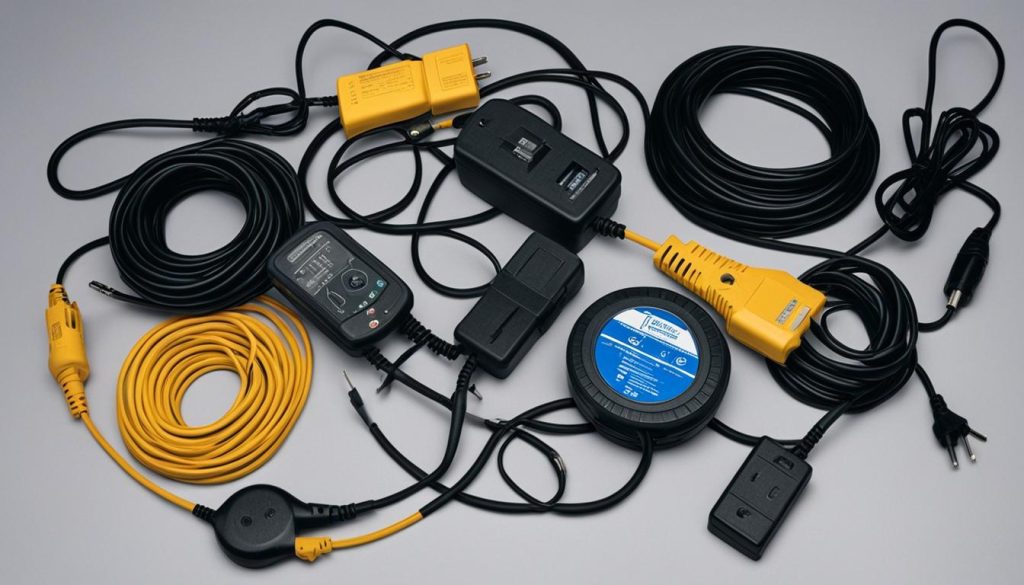
By understanding the load capacity and AWG rating of extension cords, you can make informed decisions when selecting the right cord for your appliances. Remember to always prioritize safety and choose extension cords that are suitable for the electrical load you intend to connect.
Extension Cord Safety Precautions to Follow
To ensure your safety when using extension cords, it is important to follow specific precautions. By taking these steps, you can reduce the risk of electrical accidents and potential fire hazards.
- Use power strip surge protectors only for devices that require low levels of power, such as computers and lamps. This helps prevent overloading and ensures the safety of your appliances.
- Avoid plugging high-capacity appliances, such as washing machines or air conditioners, into power strips. These devices draw a significant amount of power and should be connected directly to a wall outlet.
- Always connect extension cords directly to a wall outlet instead of daisy chaining them or plugging them into other extension cords. This helps maintain a safe electrical connection and prevents overloading.
Following these extension cord safety precautions can go a long way in protecting you, your appliances, and your home from potential electrical hazards. Take the necessary steps to ensure your safety and enjoy the convenience that extension cords provide.
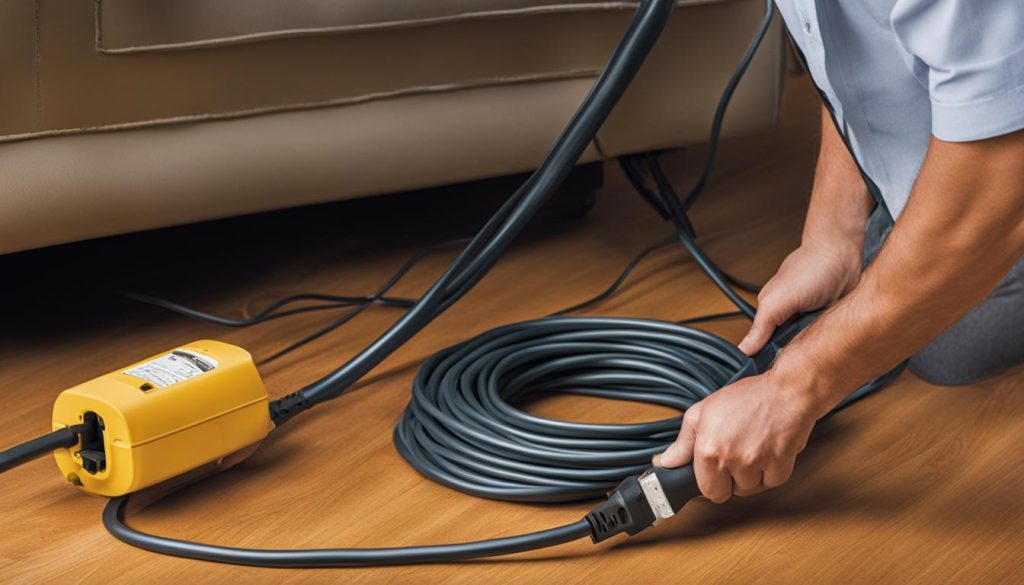
“Use power strip surge protectors only for devices that require low levels of power, such as computers and lamps.”
Remember, using extension cords responsibly is crucial for maintaining a safe electrical environment. By adhering to these safety measures, you can enjoy the convenience of extension cords without compromising your well-being.
The Importance of Additional Outlets in Your Home
Many homes, especially older ones, have a limited number of electrical outlets, which can be inconvenient when using multiple appliances and electronics. To address this issue, it is important to consider adding additional outlets to your home. Professional electricians can assess your electrical system and install additional circuits and outlets to meet your specific needs. This can help ensure the safety and functionality of your electrical system and prevent the overreliance on extension cords and power strips.
Outdated electrical systems with a limited number of outlets can lead to multiple appliances being plugged into a single extension cord, increasing the risk of overloading and overheating. This can pose significant safety hazards, such as electrical fires and damage to your appliances. By adding more outlets, you can distribute the electrical load evenly and reduce the reliance on extension cords, minimizing the risk of accidents.
Professional electrician services play a crucial role in assessing your home’s electrical system and determining the best locations for additional outlets. They have the knowledge and expertise to ensure that the new outlets are properly installed and meet safety standards. Hiring a professional electrician also ensures that the work is done correctly, minimizing the risk of electrical accidents and ensuring the longevity of your electrical system.
By investing in additional outlets, you can enhance the convenience and safety of your home. You’ll have more flexibility in arranging your appliances and electronics, reducing the need for long extension cords that can be tripping hazards. Additionally, having more outlets can improve the aesthetics of your living spaces, as you won’t have cables crisscrossing your rooms.
When considering the installation of additional outlets, it is advisable to consult with a professional electrician. They will assess your electrical needs, determine the load requirements, and provide recommendations for the number and location of outlets to ensure optimal functionality and safety.
| Benefits of Additional Outlets | Risks of Overreliance on Extension Cords |
|---|---|
|
|
Conclusion: Prioritizing Electrical Safety and Proper Usage
Ensuring electrical safety should be a top priority in every home. By understanding how extension cords work, following usage guidelines, and taking necessary precautions, you can prevent electrical accidents and potential fire hazards. It is important to use extension cords properly and avoid overloading them with high-capacity appliances.
Remember to check the amp usage of your appliances and avoid plugging multiple high amp appliances into the same extension cord. Additionally, choosing the correct extension cord based on load capacity and distance from the power source is crucial.
If you find yourself frequently relying on extension cords, it may be time to consider adding additional outlets to your home. Consulting a professional electrician can ensure that the electrical system is properly evaluated and additional circuits and outlets are installed safely.
By prioritizing electrical safety and proper usage, you can protect your home, appliances, and loved ones from potential dangers. Take the necessary steps to prevent electrical accidents and create a safe environment for everyone in your household.
FAQ
Can you plug a washer into an extension cord?
It is generally not recommended to plug a washer into an extension cord. Washers and other high-capacity appliances should be directly connected to a wall outlet to avoid potential fire hazards and overloading the extension cord.
How do extension cords work?
Extension cords allow you to extend the reach of electrical outlets and connect multiple appliances to a single power source. Each appliance connected to an extension cord draws the current it needs from the outlet.
Are electrical extensions safe?
Improper usage of extension cords can lead to electrical fires and damage to electrical equipment. According to the US Consumer Product Safety Commission, about 3,300 electrical fires are caused annually by incorrect extension cord usage.
What are the guidelines for using an extension cord with a washing machine?
Washing machines and other high-capacity appliances should not be plugged into the same extension cord simultaneously. Most appliances with an amp usage under 0.5 can be safely connected to the same extension cord, but those using upwards of 8 amps should not be plugged into the same multiplug extension.
What do extension cord ratings indicate?
Extension cords are classified according to their load capacity, which is influenced by factors such as cord length and wire thickness. The American Wire Gauge (AWG) rating indicates the thickness of electrical extensions, with lower AWG numbers indicating thicker wires and higher load capacities.
What safety precautions should I follow when using an extension cord?
It is recommended to use extension cords directly connected to a wall outlet and avoid daisy chaining power strips or plugging extension cords into other extension cords. Only use power strip surge protectors for low-power devices and avoid plugging high-capacity appliances into power strips to prevent overloading and potential fire hazards.
Why is it important to have additional outlets in your home?
Many homes, especially older ones, have a limited number of electrical outlets. Adding additional outlets can prevent the overreliance on extension cords and power strips, ensuring the safety and functionality of your electrical system.
How can I prioritize electrical safety and proper extension cord usage?
By understanding how extension cords work, following usage guidelines, and taking necessary precautions, you can prevent electrical accidents and potential fire hazards. It is important to use extension cords properly and avoid overloading them with high-capacity appliances. If additional outlets are needed, consulting a professional electrician is recommended.
